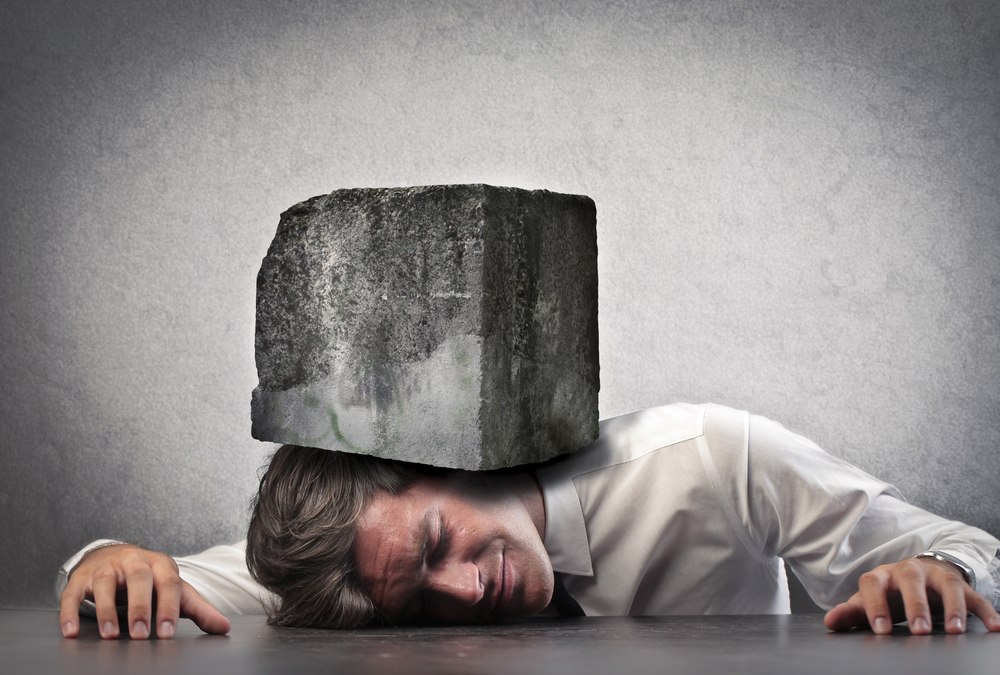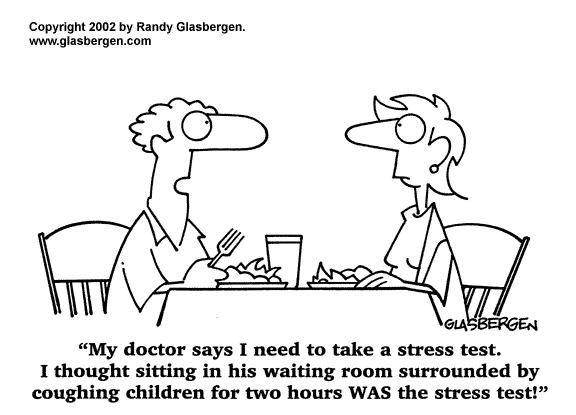Wanneer we langdurig onder stress lijden, is er een kans dat we in een burnout verzeild geraken. Dit filmpje legt in een notendop de oorzaken, symptomen en behandeling uit.
Author: meeravanderstappen
The science of stress
Dit artikel is wetenschappelijk onderbouwd en legt uit wat stress als effect heeft op ons lichaam. Tegenwoordig krijgt men meer en meer met stress te maken. Het is niet langer de uitzondering, maar de regel.
Uit een studie (2011) is gebleken dat een kwart van de mensen ‘extreme’ stress ervaart en dat bijna de helft van de ondervraagden heeft aangetoond dat ze veel meer stress ervaren dan vijf jaar geleden.
Hoe komt dat? Door onze moderne samenleving zijn we genoodzaakt om te multitasken, zijn we overgestimuleerd en hebben we veel verschillende zaken aan ons hoofd. Van nature kan de mens een stressmoment goed aan als hij ook genoeg tijd krijgt om te recupereren. En daar zit nu net het probleem: we gaan zo snel, dat we vergeten tijd te nemen om te herstellen.
Understand how stress operates in your body — and how to build resilience.
Consider the car alarm.
You’re trying to concentrate on a project that’s due in less than two hours, and that horn has been beeping outside your window for the last five minutes. Its effects are impossible to ignore. Your heart rate is up. Your jaw is tight. Your stomach roils as the clock ticks toward the deadline. Though you are normally someone who walks miles to avoid an argument, you briefly contemplate throwing a brick through the windshield of that car in self-defense.
This is what stress feels like. And while moments like these are familiar to everyone, studies suggest that today these feelings have become the rule of our collective experience, rather than the exception.
When the American Psychological Association conducted its annual survey on stress in 2011, nearly a quarter of respondents reported their levels of stress as “extreme.” Thirty-nine percent said their stress had gone up in the past year, and 44 percent said it had increased in the past five years.
Respondents more or less agreed that chronic stress had a negative impact on their quality of life, and yet — despite the fact that most of us can easily identify what stress feels like — nearly a third of respondents said they believe stress is strictly psychological and has no impact on physical health.
Experts across medical disciplines agree that this is a dangerous misperception.
“The stress response is a normal adaptive coping response that evolved over hundreds of millions of years to help our ancestors avoid sticks and get carrots,” says Rick Hanson, PhD, a neuropsychologist and author of Buddha’s Brain: The Practical Neuroscience of Happiness, Love, and Wisdom (New Harbinger, 2009). “It’s natural. What’s also natural, though — and you see it in the wild — is that most stressful episodes are resolved quickly, one way or another. The natural biological, evolutionary blueprint is to have long periods of mellow recovery after bursts of stress.”
The problem, according to Hanson, is that “modern life exposes us to mild-to-moderate, but chronic, stress constantly — multitasking, juggling too many things, moving too quickly, being bombarded with stimulation.” In other words, we’re simply not designed to flee from predators for 10 hours a day with no breaks. But that is essentially what we do.
Roberta Lee, MD, vice chair of the Department of Integrative Medicine at Beth Israel Medical Center in New York City, calls the now-common condition of constant pressure “superstress.” In her book The Superstress Solution (Random House, 2010), she lists the variety of stressors many now take for granted: job dissatisfaction, overwork, inadequate salaries, not enough time with partners and family, noise pollution, lack of outdoor time, and “spiritual angst” prompted by a loss of meaning and purpose, as well as a loss of connection with others.
As Henry Emmons, MD, of the Penny George Institute for Health and Healing in Minneapolis, points out, “your body can’t differentiate between a saber-toothed tiger attack and a bad job review.” The nerve-and-hormone response is the same. And over time, the intensity of the stress response wears a body down.
Lee compares the effects of a near-constant cascade of stress hormones to revving an auto engine all day. “You’ve got your foot on the accelerator all the time, even when you’re resting,” she says, “and you’re overutilizing every element of your body, like you do with a car when you’re revving up an engine. You overuse the oil. You increase heat.”
The resulting physical symptoms range from annoying to debilitating. “What I mostly experience with patients in my practice is anxiety,” says Los Angeles–based naturopathic physician Holly Lucille, ND, RN, author of Creating and Maintaining Balance: A Woman’s Guide to Safe, Natural Hormone Health (Impakt Health, 2004). “When you’re overly stressed, you have a decrease in stress resistance — I call it ‘short-fuse syndrome.’”
This is when we start contemplating putting bricks through windshields. The following pages will explain the effects of such high-stress moments on different organs. It will also help you understand what you can do to cool those fires — and build a more stress-resilient body for the long haul.
Hieronder wordt uitgelegd welk effect stress heeft op ons lichaam. Stress geeft ons brein een beschermingsimpuls, wat goed is. Krijgen we dat soort impuls te vaak, kan het zijn dat onze hersenen beschadigd geraken, wat lijdt tot geheugenverlies, slaapproblemen, slecht humeur enz.
De hypofyse gaat bij stresssituaties cortisol aanmaken en dat zorgt ervoor dat glucose en vet mee in ons bloed worden opgenomen. Daarom hebben we minder honger tijdens stressmomenten.
Ook ons hart lijdt eronder. Het heeft moeite met pompen en we hebben een verhoogde bloeddruk. Door chronische stress wordt ons hart uitgeput.
Hetzelfde geldt voor onze bijnieren. Als zij te vaak onze reserve aan adrenaline moeten gebruiken, lijdt dat tot vermoeidheid, zwakte, een verlaagde immuniteit enz.
Stress heeft ook een invloed op ons buik- en darmstelsel. Het maakt dat we meer zuren aanmaken, waardoor onze ingewanden geïnfecteerd kunnen worden. Daardoor gaan we geen nutriënten meer uit onze voeding halen.
Daarbij zorgt stress voor een toename in gewicht, een lager libido, mogelijke onvruchtbaarheid en we gaan er sneller ouder uit zien.
YOUR BODY UNDER PRESSURE
Here’s what happens to our organs and biochemistry when we’re stressed out . . .
The Brain
The stress response begins above your shoulders. The amygdala (a cluster of cell
nuclei inside the temporal lobe that processes emotional data) sends a threat message to the hypothalamus, which in turn tells the sympathetic nervous system to protect you from attack. The nervous system increases heart rate , constricts some blood vessels and dilates others, slows down the intestines, inhibits digestive secretions, and prompts glands to flood the system with cortisol.
, constricts some blood vessels and dilates others, slows down the intestines, inhibits digestive secretions, and prompts glands to flood the system with cortisol.
If this alarm is set off too often, it can do serious physical damage. “When too much cortisol is hitting the brain for an elevated amount of time,” Lucille says, “you start to create something called hippocampal brain damage, and the results of this are disturbed circadian rhythms: Your sleep-wake cycle is disturbed. You get moody, and you get memory loss, brain fog.”
The Pituitary Gland
Sometimes called the “master gland,” the pituitary controls most of the other glands in the body, regulating a host of functions including body temperature, thyroid activity and urine production (hence those sweaty palms and frequent bathroom trips when you’re nervous). During the stress response, the pituitary produces adrenocorticotropic hormone (ACTH), which prompts the adrenal glands to produce cortisol. Cortisol increases arterial blood pressure, pulling glucose and fat from body tissues into the bloodstream for energy, one reason appetite diminishes during acute stress.
The pituitary gland also releases thyroid-stimulating hormone, which stimulates the thyroid gland to produce thyroxine. Thyroxine increases the metabolic rate, raises blood-sugar levels, and increases respiration, heart rate and blood pressure — all essential to a quick burst of activity. But the metabolic boost from thyroxine uses up nutrients too quickly, so the body overuses B vitamins and excretes calming magnesium.
The Heart
Blood vessels constrict during the stress response, which makes it harder for the heart to pump blood. High blood pressure from constricted vessels and increased cortisol and thyroxine only exacerbates inflammation and arterial plaque buildup.
Additionally, fatty acids released into the bloodstream by cortisol can lead to overproduction of low-density cholesterol (LDL).
High-density cholesterol, or HDL, actually helps keep the circulatory system functioning and has powerful healing value. But, notes Lee, the so-called bad version, LDL, contributes to dangerous plaque buildup on arterial walls that have been inflamed by toxins and high blood sugar — common byproducts of stress eating.
And all this sets the stage for cardiac arrest, says Lee.
Adrenal glands
Upon detecting a threat, the hypothalamus signals the adrenal medulla (an autonomic-nervous-system node next to the adrenal glands) to secrete two hormones — adrenaline and noradrenaline — into the bloodstream. These increase heart rate and blood pressure. Blood is pumped to extremities and their muscles to help you run or go into battle, while gastrointestinal activity is reduced, producing the feeling of butterflies in the stomach. When this complex process is repeated routinely with no time for recuperation, you start to feel both
lethargic and wound up — tired but wired.
 Chronic stress also wears out the adrenal glands by overusing their store of energizing adrenaline. According to Lee, this can lead to a condition that integrative and naturopathic doctors identify as “adrenal fatigue,” which can manifest as exhaustion, physical weakness, immune suppression, hormone imbalances, skin problems and depression. (To learn more about this condition, seeELmag.com/adrenal2011.)
Chronic stress also wears out the adrenal glands by overusing their store of energizing adrenaline. According to Lee, this can lead to a condition that integrative and naturopathic doctors identify as “adrenal fatigue,” which can manifest as exhaustion, physical weakness, immune suppression, hormone imbalances, skin problems and depression. (To learn more about this condition, seeELmag.com/adrenal2011.)
Stomach and Intestines
The slowdown of the digestive process triggered by the sympathetic nervous system and the thyroid can prompt either overproduction or underproduction of digestive acids. Overproduction can lead to painful acid reflux (heartburn), while underproduction means your stomach has limited digestive power. Too little stomach acid can leave food in the system so long that it ferments rather than digests. This can produce bloating, create inflammation of the intestinal tissue and reduce the overall absorption of nutrients.
“If your bowel’s inflamed,” says Emmons, “you’re not getting nutrients out of the food you eat. You can eat really great food but still not benefit from it.”
Body Fat
While some people do lose weight under stress, research reveals that high levels of cortisol can also encourage weight gain in two ways:
(1) Cortisol amps up the appetite for quick energy (namely, carbohydrates and sugar), triggering cravings and overeating. (2) Cortisol also puts excess glucose in the bloodstream. When it’s not burned off through exercise (the equivalent of sprinting away from or fighting off the perceived attacker), it gets stored as fat in your body’s tissues.
That makes chronic stress a real enemy of overall fitness, Emmons points out. “You tend to gain weight because cortisol is making you want to eat more. But it’s also making you more likely to hold on to that food as fat, especially as abdominal fat.”
Reproductive system
Progesterone is a crucial hormone for fertility in women; it nourishes the lining of the uterus to support the implantation of an embryo and sustain a pregnancy. It’s also a key ingredient in the creation of cortisol in the adrenal glands. When the body demands large amounts of cortisol, its total amount of progesterone can diminish, leading to low libido and possible infertility. (For more details about how stress affects your romantic and reproductive life, see ELmag.com/libido.)
The Aging Process
In 2004 a University of California, San Francisco research team reported that chronic stress may play a role in shortening telomeres, the tiny protein complexes at the ends of chromosomes that help protect genetic information as cells divide. As telomeres shorten, cells lose the ability to divide; they can also get confused about their mission and start to manifest serious ailments, from Parkinson’s to heart disease. (Other studies have linked shortened telomeres with the onset of dementia.) While cell loss is an integral part of the aging process, chronic stress accelerates it by munching away at these protective proteins so they diminish faster than they would naturally.
Het artikel eindigt met tips te geven om stress te verminderen. Voorbeelden die hier worden aangehaald zijn rust nemen, mediteren, letten op voeding, sporten en positief zijn.
TURNING DOWN THE INTENSITY
Short of winning the lottery and moving to a nice island with your favorite people (which would soon introduce anxieties associated with boredom), how does one actually reduce stress?
The first thing to remember, says Hanson, is that our emotional reaction to events initiates the stress response. “We need to make a distinction between events and our experience of them,” he says. “An event that’s highly stressful for some people is no big deal for others.”
The key to lowering stress, according to Hanson, is to build resilience. Since we have only modest control over what happens to us, our best hope is to train ourselves to respond to stressful circumstances without triggering the alarm system every time. What follows are some of the building blocks for a more stress-resilient body. (For more on building resiliency, go to ELmag.com/resiliency.)
Rest
The best way to quiet the body-mind’s stress response, and to support the recovery process, says Lee, is “to relax and rest as deeply as you can — to rest as if you were on your best vacation ever.”
What does that sort of profound rest accomplish? It charges up the parasympathetic “rest-and-digest” system (the antithesis of the sympathetic “fight-or-flight” system), which powers the body’s  reparative and digestive activities.
reparative and digestive activities.
When deep rest is in short supply, you can still support parasympathetic activity by taking frequent short breaks — ideally every 90 to 120 minutes (seeELmag.com/takeabreak).
Finding ways to improve sleep quality is also vital, says Emmons. “This can include meditative practices, deep breathing, exercising early in the day, and getting seven or eight hours a night of sleep whenever possible. Naps can be helpful, too, if they’re short, 30 to 45 minutes. Any longer and your sleep cycles may be disrupted.”
Nutrition
A well-fed body is a resilient body — far better equipped to handle stress and to recover from hormonal floods.
Keeping sugar and flour to a minimum while eating plenty of healthy fats and good protein (grass-fed meats, fish, legumes, nuts) will help keep blood sugar on an even keel. This supports good energy, mental clarity and stable mood — all of which lead to more grace under pressure.
Lee advocates the Mediterranean diet, which includes plenty of legumes, greens and fish. She also likes that it promotes a proper balance of omega-3 and omega-6 fatty acids and soothes intestinal inflammation.
As for stress-busting supplements, many integrative doctors recommend taking a good-quality fish oil as well as a B-vitamin complex, since stress tends to deplete B-vitamin levels. Both have shown measurable effects in treating depression, another common byproduct of chronic stress.
Meditation
Studies show that mindfulness meditation — becoming a calm observer of your own thoughts and emotions — stimulates the parasympathetic nervous system. “Meditation,” says Emmons, “is one way of sending signals [to your body’s stress-response system] that it’s OK to stand down.”
 Hanson adds that meditation can also reduce frantic neurological activity in the amygdala, the alarm bell of the brain. Self-reflection (a fairly advanced activity, as far as brains are concerned) shifts activity to the neocortex, or “executive center.”
Hanson adds that meditation can also reduce frantic neurological activity in the amygdala, the alarm bell of the brain. Self-reflection (a fairly advanced activity, as far as brains are concerned) shifts activity to the neocortex, or “executive center.”
When the brain starts to rely more on the neocortex and less on the amygdala, it begins to strengthen new neural pathways that incline the brain away from reactivity and toward calmer, more constructive responses.
Exercise
We all need some kind of physical movement to stay stress-resilient, whether it’s walking, biking, doing yoga or shooting hoops. Emmons notes that  the stress response is inextricably connected to exercise — after all, it’s preparing us to run fast or fight hard — so “vigorous exercise helps to bring down adrenaline levels, while gentler exertion is good for lowering cortisol.” Lee points out that exercise also produces positive mood elevators (endorphins and serotonin) and breaks down cortisol in the bloodstream.
the stress response is inextricably connected to exercise — after all, it’s preparing us to run fast or fight hard — so “vigorous exercise helps to bring down adrenaline levels, while gentler exertion is good for lowering cortisol.” Lee points out that exercise also produces positive mood elevators (endorphins and serotonin) and breaks down cortisol in the bloodstream.
Positivity
In her book Positivity (Three Rivers Press, 2009), positive psychology researcher Barbara Fredrickson, PhD, notes that for individuals to flourish, they need a “positivity ratio” of three positive experiences to each negative one. In her second book, Love 2.0 (Penguin Publishing, 2013), she explores how “micro-moments” of positive connection with  others, even strangers, improve health and longevity. Her current study at the University of North Carolina is testing whether meditation with a deliberately positive element — like focused, caring attention on another person — reduces stress even more than mindfulness meditation.
others, even strangers, improve health and longevity. Her current study at the University of North Carolina is testing whether meditation with a deliberately positive element — like focused, caring attention on another person — reduces stress even more than mindfulness meditation.
Hanson describes similar studies showing that amygdala-based cell receptors for oxytocin (an amygdala-calming hormone) increase in number when we foster feelings of compassion.
This all illustrates what one might call the neurophysiology of positive connection. In a chronically stressed world, acts of love, compassion and connection can help mute or shut off the brain’s alarm system when we don’t need it. In the absence of these overstimulating hormones, we become calmer and healthier.
It seems that what we are really built to do is to treat ourselves and others well — not flee from tigers all day long.
Bron: https://experiencelife.com
Auteur: JON SPAYDE
10 Best foods for stress relief
Goed nieuws voor de foodies onder ons! Deze 10 voedingswaren zouden stress verhelpen. Mijn favoriet is alvast watermeloen!
10 Ontspanningstechnieken tegen stress
Ik heb dit artikel gevonden op een professionele site. Het geeft 10 gemakkelijke ontspanningstechnieken tegen stress mee onder leiding van dokters. Zij verklaren ook hoe de technieken juist in z’n werking gaan. Je hebt niets te verliezen, dus ik zou het zeker eens uitproberen de volgende keer dat je stress ervaart!
Relax. You deserve it, it’s good for you, and it takes less time than you think.
You don’t need a spa weekend or a retreat. Each of these stress-relieving tips can get you from OMG to om in less than 15 minutes.
1. Meditate
A few minutes of practice per day can help ease anxiety. “Research suggests that daily meditation may alter the brain’s neural pathways, making you more resilient to stress,” says psychologist Robbie Maller Hartman, PhD, a Chicago health and wellness coach.
It’s simple. Sit up straight with both feet on the floor. Close your eyes. Focus your attention on reciting — out loud or silently — a positive mantra such as “I feel at peace” or “I love myself.” Place one hand on your belly to sync the mantra with your breaths. Let any distracting thoughts float by like clouds.
2. Breathe Deeply
 Take a 5-minute break and focus on your breathing. Sit up straight,eyes closed, with a hand on your belly. Slowly inhale through your nose, feeling the breath start in your abdomen and work its way to the top of your head. Reverse the process as you exhale through yourmouth.
Take a 5-minute break and focus on your breathing. Sit up straight,eyes closed, with a hand on your belly. Slowly inhale through your nose, feeling the breath start in your abdomen and work its way to the top of your head. Reverse the process as you exhale through yourmouth.
“Deep breathing counters the effects of stress by slowing the heart rate and lowering blood pressure,” psychologist Judith Tutin, PhD, says. She’s a certified life coach in Rome, GA.
3. Be Present
Slow down.
“Take 5 minutes and focus on only one behavior with awareness,” Tutin says. Notice how the air feels on your face when you’re walking and how your feet feel hitting the ground. Enjoy the texture and taste of each bite of food.
When you spend time in the moment and focus on your senses, you should feel less tense.
4. Reach Out
 Your social network is one of your best tools for handling stress. Talk to
Your social network is one of your best tools for handling stress. Talk to
others — preferably face to face, or at least on the phone. Share what’s going on. You can get a fresh perspective while keeping your connection strong.
5. Tune In to Your Body
Mentally scan your body to get a sense of how stress affects it each day. Lie on your back, or sit with your feet on the floor. Start at your toes and work your way up to your scalp, noticing how your body feels.
Stress: de 15 grootste boosdoeners op de werkvloer
Dit artikel is zeer interessant voor mensen die (soms) stress ervaren op het werk. Deadlines halen, vaak herhaaldelijke taken, loonsverwachtingen die niet uitkomen, dagelijks in de file, … zijn allemaal dingen die niet onbekend klinken. Het zijn allemaal redenen om gestresseerd door te worden. Hier wordt uitgelegd wat de 15 grootste oorzaken van stress zijn op het werk. Wees stresssituaties een stap voor door dit artikel te lezen!
Werkvoorwaarden
1. Onregelmatig werken
Weekendwerk, nachtshifts en overuren kunnen aanleiding geven tot stress. Een sector die veel met deze problematiek te kampen heeft is de welzijnssector. Als je als verpleegster een volledige week ‘s nachts moet werken en door personeelsgebrek ook nog eens twee weekendshifts erbij moet nemen, weet je wel hoe laat het is. Je familiaal leven en je vrije tijd worden op zo’n moment zwaar belast.
Ook het feit dat een uurrooster ‘flexibel’is en wekelijks of zelfs dagelijks kan veranderen speelt mee in het ontstaan van stress. In extreme gevallen kan je niets meer plannen en zit je gewoon thuis te wachten tot je werkgever je opbelt.
2. Te weinig loon
Een te laag loon voor je prestaties zullen je kijk op je werk niet verbeteren. Daarnaast is ook gebleken dat prestatieloon of commissies allesbehalve bevorderlijk zijn. Dat is vreemd want dit type loon is in de eerste plaats juist bedoeld om de mensen extra te motiveren. Het effect is omgekeerd want mensen voelen zich onder druk gezet om extra te presteren.
3. Geen toekomstperspectief
Zit je in een baan waar je promotie-uitzichten onbestaande zijn? Of maak je zelfs geen kans om te veranderen van afdeling? Dan is de kans groot dat je met tegenzin naar je werk gaat en last krijgt van stressverschijnselen.
4. Slechte sfeer
Ook de sfeer op het werk is allesbepalend voor je gemoed. Ooit al een van volgende situaties meegemaakt?
- Je doet je werk graag maar voor hulp moet je zeker niet gaan aankloppen bij je collega’s.
- De sfeer met de collega’s is goed maar zodra de baas binnenkomt heerst er een donderstemming en kan er geen vriendelijk woord meer af.
- Als één van de weinige vrouwen op je afdeling is het blijkbaar steeds jouw taak om koffie te zetten en de keuken op te ruimen.
- Je kan je dag niet zelf indelen maar moet steeds het tempo volgen van een ander.
De voorgaande beweringen zijn allemaal uitingen van een slecht sociaal contact. Het maakt er het werkende leven niet gemakkelijker op en je zal zien dat de mensen die geconfronteerd worden met zulke situaties vaak onder grote druk komen te staan.
Werkinhoud
Ook de inhoud van je werk bepaalt mee hoeveel risico je loopt op stress:
 5. Is je werk te moeilijk?
5. Is je werk te moeilijk?
6. Heb je te veel werk met te strakke deadlines?
7. Moet je altijd hetzelfde doen?
8. Geeft je baas je opdrachten maar is jou nooit duidelijk wat hij precies wil?
Werkomstandigheden
Tot slot zijn er ook op de werkvloer zelf een heel aantal factoren die werknemers stress kunnen bezorgen, bijvoorbeeld:
9. Te veel lawaai
Hoe langer hoe meer onderzoek bewijst dat lawaai de mensen geen goed doet. Het lawa ai begint voor velen onder ons al in de ochtendfiles en het houdt pas op na de avondfiles. Als je daarbovenop ook tijdens je werkuren nog veel geluid te verwerken krijgt, is het maar normaal dat je een zekere stress opbouwt.
ai begint voor velen onder ons al in de ochtendfiles en het houdt pas op na de avondfiles. Als je daarbovenop ook tijdens je werkuren nog veel geluid te verwerken krijgt, is het maar normaal dat je een zekere stress opbouwt.
10. Te veel of te weinig licht
Te veel of te weinig licht zijn op lange termijn nefast voor de werkdruk. Onder verlichting hoort ook het computerscherm dat te fel of te weinig oplicht en zo voor de nodige problemen zorgt.
11. Te warm/te koud
Veel bedrijven zijn tegenwoordig uitgerust met een peperduur airconditioningsysteem. Het probleem dat zich vaak stelt is de instelling van zo’n systeem. Het kan niet de bedoeling zijn dat mensen voortdurende in een kille tocht zitten, noch dat ze vakantiekleding moeten aantrekken omdat de warmte ondraaglijk is. Bij een aanhoudende hittegolf zal je ook zien dat de mensen door de warmte extra belast worden.
12. Onveilig werk
Wie elke dag vreest voor zijn leven of elke minuut van de dag de kans loopt om besmet te raken door chemische of nucleaire stoffen, kampt vanzelfspreken met een hogere werkdruk. Als er bovendien nog eens onvoldoende veiligheidsmaatregelen voorhanden zijn, is het hek helemaal van de dam.
13. Een slechte houding
 Wie de hele dag achter een computer zit, komt ‘s avonds vaak met nekpijn of hoofdpijn thuis. De werkhouding speelt dus zeker mee wanneer we het over stress hebben. Ook lang werken in dezelfde houding of voortdurend een beweging moeten herhalen is nefast voor je lichaam.
Wie de hele dag achter een computer zit, komt ‘s avonds vaak met nekpijn of hoofdpijn thuis. De werkhouding speelt dus zeker mee wanneer we het over stress hebben. Ook lang werken in dezelfde houding of voortdurend een beweging moeten herhalen is nefast voor je lichaam.
14. Te weinig personeel
Sommige sectoren kampen met een chronisch tekort aan personeel wat maakt dat één persoon het werk moet doen van twee (of zelfs meer) personen. Sectoren die momenteel te maken hebben met zo’n personeelstekort zijn het onderwijs, de welzijnssector en de informaticasector.
15. Onfrisse omgeving
Of iemand al dan niet graag gaat werken, kan ook al te maken hebben met de esthetiek van zijn werkomgeving: bepaalde kleuren werken stimulerend en rustgevend, terwijl anderen eerder stresserend zijn. De mogelijkheid om een frisse neus te gaan halen is een must. De aanwezigheid van planten kan wonderen doen. Werkt men op een landschapsbureel, of heeft ieder een eigen bureel? Hoe wordt de werkomgeving ervaren door de medewerkers? Ook met deze factoren moet zeker rekening gehouden wanneer men aan stresspreventie doet.
(On)gezonde stress
Dit artikel moet je lezen! Het woord ‘stress’ heeft vandaag zo’n negatieve connotatie, dat men vergeet dat stress ook GOED kan zijn. Een gezonde dosis stress helpt ons focussen en geeft ons het spanningsgevoel tijdens een sportwedstrijd. We mogen enkel niet vergeten ons lichaam rust te gunnen na een stresssituatie. Anders zal stress zich blijven opbouwen en trop is te veel. Dan is er sprake van slechte, ongezonde stress.
In vergelijking met pak ‘m beet vijftig jaar geleden zijn we minder gaan werken, hebben meer vakantiedagen, sporten vaker en ontspannen beter. Toch hebben we stress. En is een burn out zelfs de meest voorkomende ziekte op de werkvloer.
Voor de juiste definitie van stress slaan we de Dikke van Dale er eens op na: psychische spanning, druk, toestand waarin bepaalde
afweermechanisme in werking komen. Dat klinkt anders dan de betekenis die de meeste mensen er aan geven. Want stress is druk, druk , druk, verkeerde balans en een teveel aan spanning. Klopt. Maar stress is niet alleen maar slecht. Beter gezegd: we hebben een bepaalde mate van stress nodig om goed te functioneren.
Gezonde stress
Zoals gezegd is een beetje stress gezond. Want spanning maak je lichaam klaar om actie te ondernemen. Om te reageren als er bedreigende situaties zijn. Stress brengt als het ware je lichaam in staat van paraatheid.
Dagelijks heeft iedereen te maken met gezonde stress. Het helpt je om goed te presteren op je werk. Dat je alert bent en geconcentreerd. En het zorgt dat je veel kan doen in weinig tijd. Dit is wel tijdelijk want zodra je klaar bent, neemt de spanning weer af.
Goede stress is ook de spanning die je voelt tijdens een voetbalwedstrijd. Zeker als de wedstrijd moet worden beslist door penalty’s. Of als je nog net op tijd op je rem trapt om een ongeluk met de auto te voorkomen.
Ongezonde stress
Wanneer wordt stress ongezond? Een simpel “als het teveel is”, is niet voldoende. Het gaat om de balans. Als je een stressreactie hebt gehad, moet je lichaam daarvan herstellen. Hoe heviger de reactie, hoe meer tijd je daarvoor nodig hebt.
Heb je veel stressmomenten dan heb je relatief weinig tijd om je te herstellen. En dus stapelt de stress zich als het ware op. Als de balans tussen herstellen en nieuwe momenten kwijt is, is er sprake van ongezonde stress.
Reservetank
Het opstapelen van stressmomenten is niet meteen zichtbaar. Je houdt het zelfs nog wel een tijdje vol omdat je een reservetank hebt waar je uit kunt putten. Maar ja, je reserves raken natuurlijk wel een keer op en dan gaat je lichaam zichzelf uitputten door continu het stresshormoon aan te maken.
Dat houdt in dat je lichaam de hele tijd klaar staat om actie te ondernemen, net zo lang totdat het de kans krijgt om te herstellen. Omdat die kans er door alle stress niet is, bereik je het moment dat je het allemaal niet aankunt.
Je prestaties worden slechter en uiteindelijk ben je overspannen, of erger, heb je een burn out. Voorkomen? Bouw spanningen af en zorg dat je je lichaam genoeg tijd gunt om te herstellen.
Zelftest stress
Online heb ik een handige, snelle zelftest gevonden. Ben je benieuwd in welke mate stress een invloed heeft op jou leven? Via deze test kan je te weten komen welke factoren of omstandigheden in je leven een bron van stress vormen. Deze test is louter informatief. Als je merkt dat je toch te veel stress ervaart, neem dan zeker een kijkje bij de categorie “verhelpen” en “voorkomen”.
Link: http://stresstest.nl/stresstest.html
Hoe ontstaat stress?
Ik vond dit artikel zeer interessant omdat het uitlegt hoe stress ontstaat. Wanneer onze draaglast (wat we moeten doen) groter wordt dan onze draagkracht (wat we aankunnen), dreigen we in een stresssituatie te komen. Dit artikel geeft omstandigheden en persoonlijke eigenschappen weer die daartoe kunnen bijdragen.
Draaglast: belastende omstandigheden
De eisen die aan u gesteld worden, kunnen te groot worden. Het gaat hier om eisen en oorzaken buiten uw persoon: het zijn oorzaken in de situatie. Ze worden daarom ook wel ‘belastende omstandigheden’ genoemd. Deze oorzaken kunnen heel verschillend zijn. Ze variëren van alledaagse stress-situaties en chronisch belastende omstandigheden tot ingrijpende levensgebeurtenissen, zoals het verlies van een dierbare.
Belastende omstandigheden kunnen in het werk of in de privésituatie liggen. Vaak is er sprake van een wisselwerking en versterken ze elkaar. Ingrijpende gebeurtenissen in uw leven zorgen ervoor dat er minder energie overblijft voor uw werk. Het kan bijvoorbeeld zijn dat iemand zijn werk prima aankan, totdat één van de kinderen ziek wordt.
Draagkracht: persoonlijke eigenschappen
Naast belastende omstandigheden zijn er factoren in uw persoonlijke situatie die maken dat er stress ontstaat. Sommige mensen zijn ook gevoeliger voor stress dan anderen. Een deadline of het organiseren van een verjaardagspartijtje is voor de één een uitdaging, voor de ander een bron van spanning. De situatie alléén is dus niet doorslaggevend bij het ontstaan van stressklachten. Zeker zo belangrijk is de vraag hoe u tegen de situatie aankijkt en hoe u met stressvolle situaties omgaat. Dit bepaalt uw draagkracht.
Eigenschappen die kwetsbaarder maken voor stress zijn:
- Perfectionisme
- Zogenaamde type A-factoren: ambitie, prestatiegerichtheid, competitie, gehaastheid, niet ‘niets’ kunnen doen, vaak twee dingen tegelijk doen
- Veel van zichzelf eisen en ‘moeten’ (zoals altijd klaar moeten staan voor anderen en het werk dagelijks voor 200 procent doen)
- Groot verantwoordelijkheidsgevoel
- Grote betrokkenheid bij gezin of werk
- Streven naar waardering van anderen
- Moeilijk ‘nee’ kunnen zeggen, grenzen kunnen aangeven of voor zichzelf opkomen
- Moeilijk steun kunnen vragen
- Gevoelens slecht kunnen uiten
- Gevoel hebben weinig invloed te kunnen uitoefenen op de omgeving en het eigen leven
- Pessimisme en een weinig positieve kijk op eigen prestaties
 Persoonlijke eigenschappen zijn deels bepaald door uw karakter. Maar voor een groot deel worden ze ook bepaald door ervaringen en vaardigheden. Dat betekent dat u zelf veel kunt doen om uw draagkracht te verbeteren. Vaardigheden als assertiviteit en conflicthantering kunt u verbeteren. U kunt leren uw interpretatie van een situatie en de eisen aan uzelf om te buigen naar gedachten en verwachtingen die realistischer zijn.
Persoonlijke eigenschappen zijn deels bepaald door uw karakter. Maar voor een groot deel worden ze ook bepaald door ervaringen en vaardigheden. Dat betekent dat u zelf veel kunt doen om uw draagkracht te verbeteren. Vaardigheden als assertiviteit en conflicthantering kunt u verbeteren. U kunt leren uw interpretatie van een situatie en de eisen aan uzelf om te buigen naar gedachten en verwachtingen die realistischer zijn.
Ook ongezonde leef- en werkgewoonten kunnen uw draagkracht verminderen: verkeerde eetgewoonten, te veel koffie of alcohol, te weinig lichaamsbeweging, te weinig slaap en ontspanning, het werk niet goed organiseren, te veel werken en te weinig pauzes nemen. Uw weerstand wordt er kleiner door en u wordt vatbaarder voor de gevolgen van stress.
Stresscoach
Ben jij ook zo’n persoon die al nagelbijtend naar een examen gaat? Of die uren wakker ligt voor die grote presentatie van morgen? Of weet je niet meer waar je hoofd staat door die steeds overvolle agenda?
Wees gerust, je bent niet alleen. Stress kent geen leeftijd, ras, geslacht, … Het is een, spijtig genoeg steeds vaker voorkomend, fenomeen dat verschillende oorzaken heeft. Sommige mensen kunnen er van nature goed mee omgaan, anderen vinden nooit het bos door al die vele, irritante bomen.
Via deze blog wil ik zo’n mensen een hart onder de riem steken. Voor elk probleem bestaat er gelukkig een oplossing. Een gezonde dosis stress kan geen kwaad, maar hoe gaan we een burn-out vermijden? Hoe herken je stress en hoe verhelp je dat? Of hoe kan je stresssituaties vermijden? Op al deze vragen vind je hier een antwoord.








